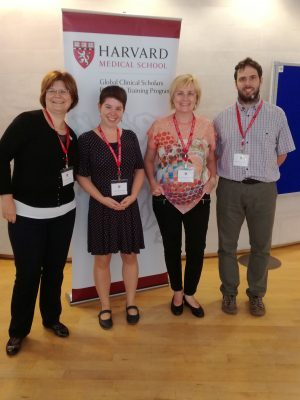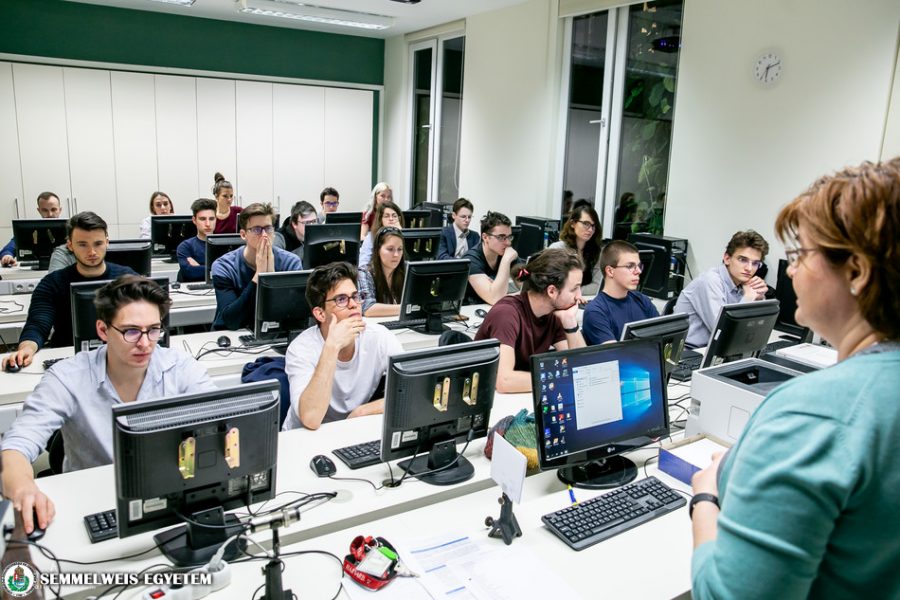“Clinical Research Methodology” is the title of the recently launched optional course at the Faculty of Medicine. The curriculum of the course was developed by members of Semmelweis University, supported by the Institute of Clinical Experimental Research, after completing Harvard Medical School’s international e-learning programme. The aim of the two-semester course is to enable students to read scientific articles on clinical topics critically as well as to be able to actively engage in clinical research as soon as possible.
 Semmelweis University is the coordinator of a large tender, joining Hungarian medical universities, whose aim is to develop scientific workshops in medical, health sciences and pharmacy trainings. This project has a number of subprograms, said Dr. Zsuzsanna Miklós, senior lecturer at the Institute of Clinical Experimental Research. One of the sub-programmes, maintained by the Clinical Experimental Research Institute, aims to deepen the knowledge in clinical research methodology of undergraduate and doctoral students. As part of this, counselling in biostatistics and personal consultation with renowned experts are organized for PhD students. They receive guidance on how to overcome their difficulties in statistical analysis, Dr. Miklós said.
Semmelweis University is the coordinator of a large tender, joining Hungarian medical universities, whose aim is to develop scientific workshops in medical, health sciences and pharmacy trainings. This project has a number of subprograms, said Dr. Zsuzsanna Miklós, senior lecturer at the Institute of Clinical Experimental Research. One of the sub-programmes, maintained by the Clinical Experimental Research Institute, aims to deepen the knowledge in clinical research methodology of undergraduate and doctoral students. As part of this, counselling in biostatistics and personal consultation with renowned experts are organized for PhD students. They receive guidance on how to overcome their difficulties in statistical analysis, Dr. Miklós said.
 The aim of the branch concerning gradual training of the sub-programme was to create a course that provides a broad insight into the methodology of clinical research. “Since there was not much experience in teaching this subject, we wanted to know how an institution of international excellence organizes this knowledge. That is how we found one of the courses in Harvard Medical School’s international programme,” said Dr. Zsuzsanna Miklós. At the suggestion of the institute’s director, Dr. Zoltán Benyó, the Global Clinical Scholars Research Training Program (GSCRT) was completed by four members of the university from different fields: Dr. Gyöngyvér Szentmártoni, from the Oncological Centre, Dr. Dániel Veres, biostatician at the Department of Biophysics and Radiation Biology, Dr. Anna Monori-Kiss, assistant lecturer, and Dr. Zsuzsanna Miklós from the Institute of Clinical Experimental Research.
The aim of the branch concerning gradual training of the sub-programme was to create a course that provides a broad insight into the methodology of clinical research. “Since there was not much experience in teaching this subject, we wanted to know how an institution of international excellence organizes this knowledge. That is how we found one of the courses in Harvard Medical School’s international programme,” said Dr. Zsuzsanna Miklós. At the suggestion of the institute’s director, Dr. Zoltán Benyó, the Global Clinical Scholars Research Training Program (GSCRT) was completed by four members of the university from different fields: Dr. Gyöngyvér Szentmártoni, from the Oncological Centre, Dr. Dániel Veres, biostatician at the Department of Biophysics and Radiation Biology, Dr. Anna Monori-Kiss, assistant lecturer, and Dr. Zsuzsanna Miklós from the Institute of Clinical Experimental Research.
“Several aspects of the methodology of clinical research were presented in the course. Legal-ethical issues, biostatistics and data analysis were also included in the curriculum, and we gained experience on how to teach them,” said Dr. Zsuzsanna Miklós. The course was essentially realized in the form of e-learning, with three workshops, in London and Boston, for students coming from all over the world. “We had to participate in several group projects with our fellow students to learn how to work in an international environment practically without meeting in person, given that a lot of clinical research is carried out this way today,” she added.
 Using the experience gained in the Harvard course, the course entitled “Clinical Research Methodology” was launched in the spring semester of 2018/19. The optional course, whose only prerequisite is “Basics of Biostatistics and Informatics”, was introduced at the Faculty of Medicine in English and Hungarian, divided into two semesters. During the development of the curriculum, it was a fundamental objective that those who have completed the course have the knowledge that would allow them to critically interpret any scientific article, summarized Dr. Zsuzsanna Miklós. “Students need to know what is necessary to determine if a research result can serve as a basis to change our clinical recommendations, and they also have to be able to recognize if the data in an article is unreliable,” she stressed. “Another aim was that students gain practical knowledge on the basis of which they can take part in research: for example, if a student is involved in a project, he or she would be able to start working immediately, because he or she would understand the terms, concepts and methods used there,” explained Dr. Miklós, adding that this can also increase the publishing activity.
Using the experience gained in the Harvard course, the course entitled “Clinical Research Methodology” was launched in the spring semester of 2018/19. The optional course, whose only prerequisite is “Basics of Biostatistics and Informatics”, was introduced at the Faculty of Medicine in English and Hungarian, divided into two semesters. During the development of the curriculum, it was a fundamental objective that those who have completed the course have the knowledge that would allow them to critically interpret any scientific article, summarized Dr. Zsuzsanna Miklós. “Students need to know what is necessary to determine if a research result can serve as a basis to change our clinical recommendations, and they also have to be able to recognize if the data in an article is unreliable,” she stressed. “Another aim was that students gain practical knowledge on the basis of which they can take part in research: for example, if a student is involved in a project, he or she would be able to start working immediately, because he or she would understand the terms, concepts and methods used there,” explained Dr. Miklós, adding that this can also increase the publishing activity.
“In the first semester, we focus on observational studies, which are more frequent in Hungary. We show the basics of designing them, provide an introduction to clinical epidemiology, give a brief biostatistic review, discuss ethical and legal issues, as well as analytical approaches that are typically present in observational studies,” said Dr. Zsuzsanna Miklós. In addition, there are practices, where students, for example, perform problem-oriented analyses using anonymous patient data. In the second semester, interventions will be the focus.

Several experts have been involved in the development of the curriculum, and the development of the related e-learning material is in progress. Dr. Zsuzsanna Miklós said that the necessity of the course is proved by the fact the first training was filled, and the classes are attended by students who already have their credits but want to become familiar with the curriculum. The lecturer added that, according to their plans, the course will also be available as a PhD course in the next semester. In the meantime, everyone is welcome, regardless of credit requirement.
Eszter Keresztes
Photo: Attila Kovács – Semmelweis University
Translation: Diána Módos


